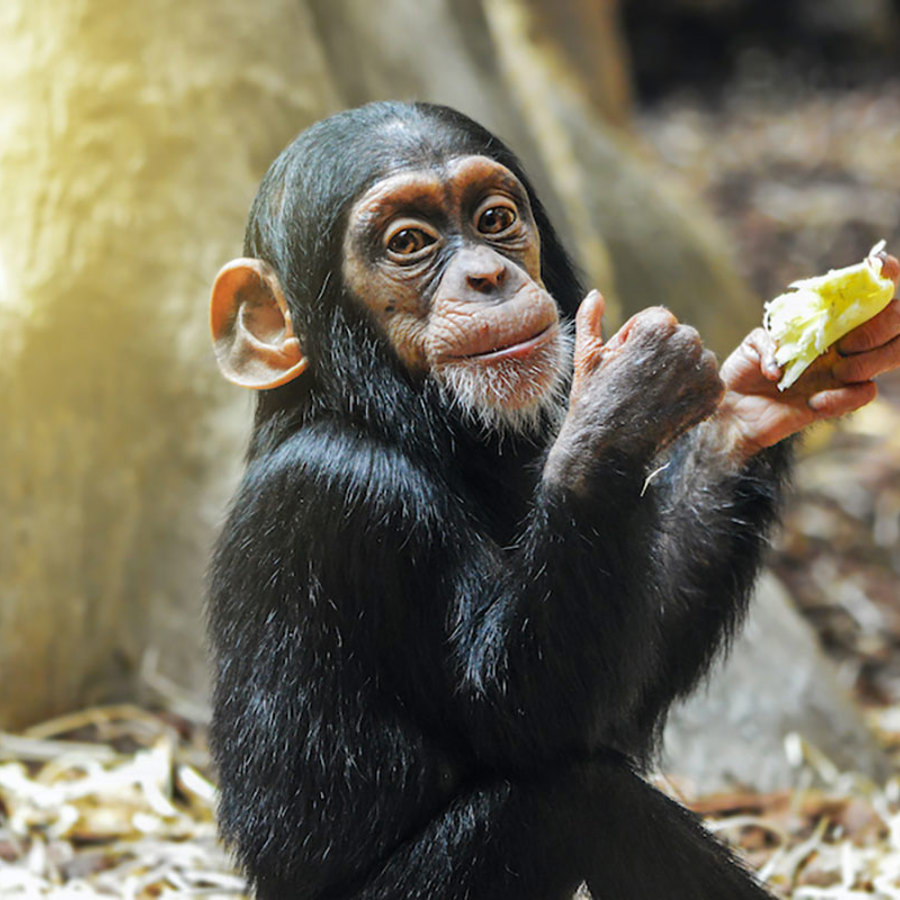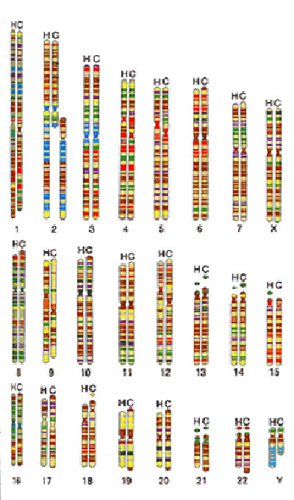
Do humans and chimps have the same number of genes?
November 16, 2004

- Related Topics:
- Comparing species,
- Human evolution,
- Evolution,
- Chromosomes
An undergraduate from Wisconsin
“I realize that humans have 46 chromosomes and chimps 48, but do we (homo sapiens) have more genes or fewer genes than the chimp? And while we’re on the subject, is the Y chromosome in humans smaller in size than the Y chromosome in chimps, meaning does it have a lower number of genes on the Y chromosome in humans in comparison to the Y chromosome in chimps?”
At the gene level, chimps and people are over 98% the same. Chimps and humans have a different number of chromosomes, but because they are so similar they probably have about the same number of genes. In fact, a close look at chimp and human chromosomes shows that one of the human chromosomes is really made up of 2 of the chimp chromosomes.

If you compare human chromosomes to chimpanzee chromosomes side-by-side, you’ll find that they’re very similar. The human chromosome 2 is similar to two chimpanzee chromosomes, which have been “split apart.”
In terms of the Y chromosome, human Y chromosomes are a little bigger than chimp Y chromosomes. However, the Y chromosomes in both species are very small. Since the Y chromosome pretty much only carries instructions for making males, humans and chimps probably have about the same number of critical male genes as well.
All of this brings up an interesting point about chromosomes. There often isn't a direct relationship between the number of chromosomes and number of genes. For example, humans have 46 chromosomes and around 30,000 genes. Chickens, by comparison, have around the same number of genes – but have 78 chromosomes!
It is easy to see why there isn’t necessarily a connection between the number of genes and the number of chromosomes when we look at the human chimp case. They have a different number of chromosomes only because one of the human chromosomes is essentially the same as two chimpanzee chromosomes.
Chimps and humans evolved from a common ancestor, meaning we started out with exactly the same number of chromosomes. Then, about 5 million years ago, the two species started to drift apart in evolution. In that time their genomes changed. Some sections were lost, some were gained, and others were copied.
Chromosomes can also be fused together or broken apart. Human chromosome 2 is similar to two smaller chromosomes in chimps. Human chromosome 2 could be a combination of the two chimp chromosomes, or a single chromosome could have broken in two in chimps. Either way, this would explain why chimps have two more chromosomes than humans.
All of this argues that chimps and humans have the same number of genes. In fact, the sections of the two genomes that code for genes only differ by 1.2% – they are 98.8% the same!
So what makes humans and chimps so different? Geneticists think that the answer lies in the sections of the genome that don't code for genes. These sections direct the activity of the genes in the genome.

Remember, genes give instructions for making proteins, and these proteins seem to be very similar in the two species. It seems that the differences come from how much, when and in what parts of the body all of these proteins are made. In fact, only 3% of the genome codes for proteins. This means that as much as 97% of the genome could be controlling the time, amount, and place of protein being made.
For example, researchers have shown that there are great differences in the amount of certain proteins made in the human and chimp brain compared to liver or heart. These proteins are very similar, but the differences in the amount of protein being made in the brain could be the answer to what makes humans and chimps so different.
As you can see, a lot can be learned about humans by comparing them to other animals. When the human genome project got underway years ago, scientists thought that the big differences between species would be in their genes.
It now looks like the DNA outside of the genes may have a bigger role, at least in closely related species like humans and chimps. Scientists hope that comparative genomics will eventually lead to a better understanding of human disease, evolution, and population genetics. So as long as we keep on asking questions like yours, the science of comparative genomics will continue to be a valuable learning tool.

Author: Flo Pauli
When this answer was published in 2004, Flo was a Ph.D. candidate in the Department of Genetics, studying tissue-specific gene expression in c. elegans in Stuart Kim’s laboratory. Flo wrote this answer while participating in the Stanford at The Tech program.
 Skip Navigation
Skip Navigation
